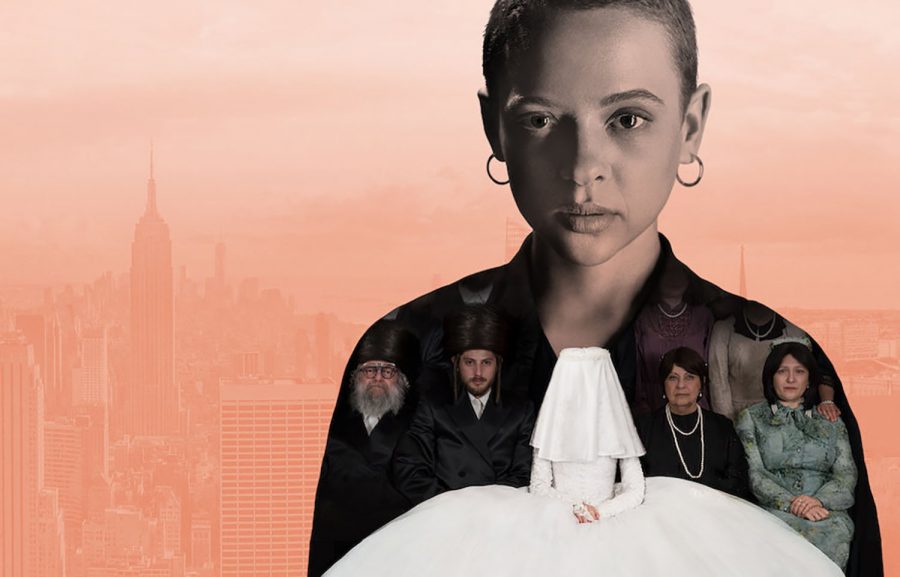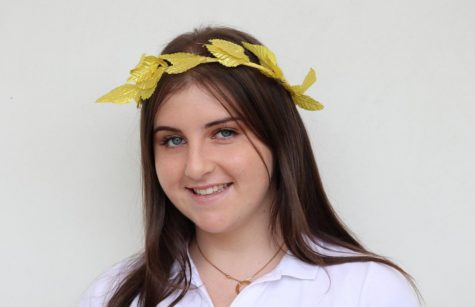Review: Netflix’s “Unorthodox” tells a journey of self-exploration with a twist
Photo credit: Netflix
The promotional image for Netflix’s original series “Unorthodox”. The show tells the story of a young Hasidic woman feeling her restricted life in Brooklyn. Esther Williams, played by Shira Haas, is forced to grapple with her past as she enters a new life.
May 20, 2020
When I think of Judaism as an adolescent, the things that typically come to mind include Bat and Bar Mitzvahs, Hebrew school and Passover dinners. However, Netflix’s new four-part miniseries “Unorthodox” was a wake-up call that Judaism does not look the same for everyone. Released on March 26, the series, which is mostly in Yiddish, follows the story of a young Hasidic Jew named Esther (Esty) Shapiro who lives in Brooklyn. However, she becomes unhappy with her arranged marriage and flees to rebuild her life in Berlin. Despite her efforts, Esty cannot escape her past easily.
The series, which is inspired by Deborah Feldman’s memoir “Unorthodox: The Scandalous Rejection of My Hasidic Roots,” offers an informative yet highly entertaining glimpse into a young woman’s journey in rejecting her roots and discovering her true self. Although many themes persist, the show is not a typical ‘coming-of-age’ story.
Esty (Esther Shapiro), played by Israeli actress Shira Haas, was raised by her grandmother and aunt in the Satmar sect of Williamsburg due to her mother’s absence and father’s alcoholism. After she is married off to Yanky Shapiro (Amit Rahav) at 19 years old, the couple faces difficulty in becoming pregnant. Due to the cultural pressures to reproduce and restrictions on her own desires, such as her passion for piano, Esty begins to feel suffocated by her community’s expectations. After saving enough money and getting the assistance of an old music teacher, Esty flees to Berlin in search of her estranged mother and a new life. While she does not immediately find her mother, she does come across a group of diverse musicians who help guide her in her newfound freedom and journey of self-exploration.
The voyage Esty takes is not only a physical journey across the Atlantic but a spiritual and emotional one as well. Viewers are also given a glimpse into Esty’s past life in Brooklyn through various flashbacks to her wedding and other key moments that fueled her unhappiness, such as the various attempts she and Yanky had to consummate their marriage and become pregnant. Although these may not be the typical conflicts portrayed in young adult stories on Netflix, the raw emotions and other conflicts presented are very real and allow for anyone to relate.
As Esty becomes a member of the group of musicians she initially stumbled into and opens up about her past, she decides to apply to join the conservatory. They initially are extremely accepting until Yael (Tamar Amit-Joseph), an Israeli member of the group, calls her out for her lack of musical talent. And although it may be true that Esty lacks the years of training the others had before reaching their current status, the drama feels slightly artificial and pointless. Another thing that feels slightly forced is the group’s immediate acceptance of Esty as a friend regardless of her obvious differences. While this would be an ideal scenario, it felt extremely artificial and unrealistic.
Along with the drama surrounding Esty’s adjustment to non-Hasidic life, her husband Yanky and his cousin Moishe (Jeff Wilbusch) are sent to Berlin by their Rabbi to bring Esty home after discovering that she is pregnant. Although I would have preferred if Esty was able to focus on discovering herself, this ‘chase’ aspect of the show added a realistic dimension and shed light on the Hasidic community’s commitment to reproduction.
Many would argue that any husband would run after his wife if she disappeared, but the emphasis placed on Esty’s pregnancy and rebuilding the Jewish population made me realize he and their community only wanted her for her child. As a viewer, I was never really sure if Yanky had feelings for Esty or just wanted to make his mother and community happy. Because of this uncertainty, I felt conflicted about whether it was best for Esty to return to Brooklyn or not.
Throughout the series, I was drawn in by Esty’s raw emotions and sarcastic wit, in addition to the multi-dimensional plot, but I also found that the series sparked some of my own self-discovery. I had never felt so disconnected from my own religion. Growing up Jewish in West Los Angeles dictated my experience in Judaism, and I never imagined that the lives of other Jews were so different.
The unique story told in “Unorthodox” sparked something in me unlike any television series has before. It has truly changed my perspective on life, but not only because I’m Jewish. The familial tension, exploration of identity and many other themes within the series make it so anyone can relate to Esty’s journey. So whether you’re Jewish, Catholic or don’t identify with any religion at all, “Unorthodox” has something for everyone, will spark some internal reflection and is definitely worth watching.









